-
 Bitcoin
Bitcoin $84,717.5853
-0.03% -
 Ethereum
Ethereum $1,580.4759
-1.22% -
 Tether USDt
Tether USDt $1.0000
0.01% -
 XRP
XRP $2.0663
-1.43% -
 BNB
BNB $589.0295
1.02% -
 Solana
Solana $134.5129
0.11% -
 USDC
USDC $0.9999
0.01% -
 TRON
TRON $0.2452
-0.11% -
 Dogecoin
Dogecoin $0.1548
-1.42% -
 Cardano
Cardano $0.6149
-1.10% -
 UNUS SED LEO
UNUS SED LEO $9.1861
-2.75% -
 Chainlink
Chainlink $12.6420
0.18% -
 Avalanche
Avalanche $19.0536
-1.74% -
 Toncoin
Toncoin $2.9784
0.67% -
 Stellar
Stellar $0.2416
1.24% -
 Hedera
Hedera $0.1659
3.30% -
 Shiba Inu
Shiba Inu $0.0...01187
-1.03% -
 Sui
Sui $2.1123
0.31% -
 Bitcoin Cash
Bitcoin Cash $331.0669
-0.93% -
 Polkadot
Polkadot $3.6696
-0.53% -
 Hyperliquid
Hyperliquid $17.1236
4.55% -
 Litecoin
Litecoin $75.1898
-0.37% -
 Dai
Dai $1.0000
-0.02% -
 Bitget Token
Bitget Token $4.3755
-0.01% -
 Ethena USDe
Ethena USDe $0.9992
0.00% -
 Pi
Pi $0.6070
-0.79% -
 Monero
Monero $216.4426
-0.77% -
 Uniswap
Uniswap $5.1827
-1.63% -
 OKB
OKB $50.2623
-2.00% -
 Pepe
Pepe $0.0...07095
-3.35%
What are the investment opportunities of blockchain in the real estate sector?
Blockchain in real estate offers investment opportunities through tokenization, smart contracts, and decentralized platforms, enhancing accessibility and efficiency.
Apr 10, 2025 at 04:08 pm
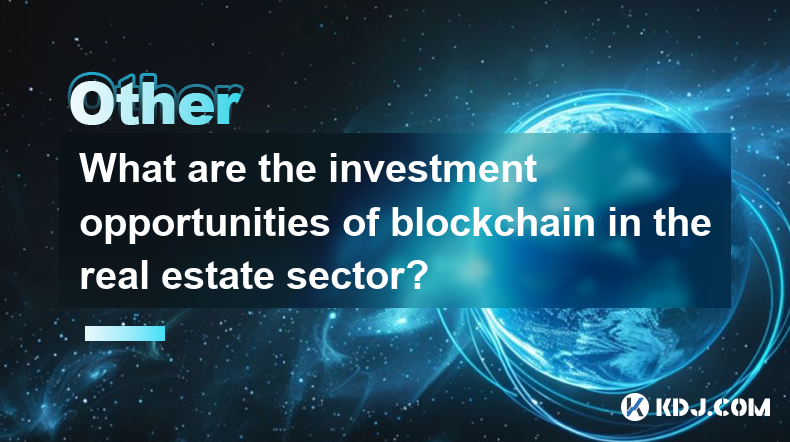
The integration of blockchain technology into the real estate sector has opened up a plethora of investment opportunities. Blockchain, a decentralized and distributed digital ledger used to record transactions across numerous computers, ensures transparency, security, and efficiency in real estate dealings. By leveraging blockchain, investors can benefit from reduced costs, faster transaction times, and enhanced trust and security. This technology can streamline property transactions, tokenize real estate assets, and facilitate fractional ownership, thereby making real estate investment more accessible and efficient.
Tokenization of Real Estate Assets
One of the most significant investment opportunities in the real estate sector through blockchain is the tokenization of real estate assets. Tokenization involves converting the ownership rights of a property into digital tokens on a blockchain. This process allows investors to buy and sell fractions of properties, making real estate investment more liquid and accessible.
- Fractional Ownership: Tokenization enables fractional ownership, allowing investors to purchase a portion of a property rather than the entire asset. This lowers the entry barrier for investors and diversifies their investment portfolios.
- Increased Liquidity: By tokenizing real estate assets, investors can trade these tokens on blockchain-based platforms, increasing the liquidity of real estate investments.
- Global Access: Tokenization opens up real estate markets to global investors, as anyone with an internet connection can invest in tokenized properties worldwide.
Smart Contracts in Real Estate Transactions
Blockchain's smart contracts are another avenue for investment opportunities in the real estate sector. Smart contracts are self-executing contracts with the terms directly written into code. They automatically enforce and execute agreements, reducing the need for intermediaries and lowering transaction costs.
- Automated Transactions: Smart contracts can automate the entire process of buying and selling property, from due diligence to closing, making transactions faster and more efficient.
- Reduced Costs: By eliminating intermediaries such as lawyers and brokers, smart contracts significantly reduce the costs associated with real estate transactions.
- Enhanced Security: The use of smart contracts ensures that all transaction terms are transparent and immutable, reducing the risk of fraud and disputes.
Decentralized Real Estate Platforms
Decentralized real estate platforms powered by blockchain technology provide a new way for investors to engage with the real estate market. These platforms operate without a central authority, offering a transparent and secure environment for real estate transactions.
- Transparency: Blockchain's transparent nature ensures that all transaction data is publicly verifiable, reducing the risk of fraudulent activities.
- Security: Decentralized platforms use cryptographic security, making them highly resistant to hacking and unauthorized changes.
- Efficiency: These platforms streamline the real estate transaction process, reducing the time and effort required to complete deals.
Real Estate Crowdfunding
Blockchain technology has revolutionized real estate crowdfunding by making it more accessible and efficient. Crowdfunding platforms on the blockchain allow multiple investors to pool their resources to invest in real estate projects, offering new investment opportunities.
- Lower Investment Thresholds: Blockchain-based crowdfunding platforms often have lower minimum investment thresholds, enabling more people to participate in real estate investments.
- Diverse Investment Options: Investors can choose from a wide range of real estate projects, from residential to commercial properties, and from development to renovation projects.
- Transparency and Accountability: Blockchain ensures that all funds raised and their allocation are transparent, fostering trust and accountability among investors.
Fractional Ownership and REITs
Real Estate Investment Trusts (REITs) are another area where blockchain can create investment opportunities. Blockchain can enhance the functionality of REITs by tokenizing them, thus allowing for fractional ownership and increased liquidity.
- Tokenized REITs: By tokenizing REITs, investors can buy and sell shares more easily, increasing the liquidity of these investments.
- Lower Costs: Tokenization can reduce the administrative and operational costs associated with managing REITs.
- Broader Access: Tokenized REITs can be traded on blockchain platforms, making them accessible to a broader range of investors.
Property Management and Leasing
Blockchain technology can also improve property management and leasing processes, presenting new investment opportunities. By using blockchain, property managers can streamline operations and enhance tenant experiences.
- Automated Rent Collection: Smart contracts can automate rent collection, ensuring timely payments and reducing the administrative burden on property managers.
- Transparent Records: Blockchain can maintain transparent records of property maintenance and tenant interactions, improving accountability and trust.
- Efficient Leasing: Blockchain can streamline the leasing process, from tenant verification to lease agreements, making it more efficient and secure.
Real Estate Data and Analytics
The integration of blockchain with real estate data and analytics can provide investors with valuable insights, enhancing their investment decisions. Blockchain can securely store and share real estate data, enabling more accurate and comprehensive market analysis.
- Secure Data Storage: Blockchain ensures that real estate data is securely stored and accessible only to authorized parties, reducing the risk of data breaches.
- Enhanced Analytics: With access to comprehensive and accurate data, investors can perform more sophisticated market analysis, leading to better investment decisions.
- Real-Time Updates: Blockchain can facilitate real-time updates of real estate data, ensuring that investors have the most current information available.
Regulatory Compliance and KYC
Blockchain can simplify regulatory compliance and Know Your Customer (KYC) processes in the real estate sector, creating a more efficient investment environment. By using blockchain, real estate transactions can adhere to regulatory requirements more seamlessly.
- Streamlined KYC: Blockchain can streamline the KYC process by securely storing and verifying identity information, reducing the time and effort required for compliance.
- Regulatory Compliance: Smart contracts can be programmed to ensure that all transactions comply with relevant regulations, reducing the risk of non-compliance.
- Audit Trails: Blockchain provides immutable audit trails of all transactions, making it easier to demonstrate compliance with regulatory requirements.
Cross-Border Real Estate Investments
Blockchain technology can facilitate cross-border real estate investments by simplifying the process and reducing associated risks. This opens up new investment opportunities for investors looking to diversify their portfolios globally.
- Reduced Barriers: Blockchain can reduce the barriers to cross-border investments by providing a secure and transparent platform for transactions.
- Currency Conversion: Blockchain can streamline currency conversion processes, making it easier for investors to invest in properties in different countries.
- Legal and Regulatory Simplification: Smart contracts can help navigate the complexities of different legal and regulatory environments, making cross-border investments more feasible.
Future Potential and Innovations
The future potential of blockchain in the real estate sector is vast, with ongoing innovations continuing to create new investment opportunities. As blockchain technology matures, it is likely to further transform the real estate industry.
- Integration with IoT: The integration of blockchain with the Internet of Things (IoT) can enhance property management and security, offering new investment opportunities in smart buildings.
- AI and Machine Learning: The combination of blockchain with AI and machine learning can provide more sophisticated real estate data analysis, leading to better investment decisions.
- Eco-Friendly Investments: Blockchain can facilitate investments in eco-friendly and sustainable real estate projects, aligning with growing investor interest in environmental, social, and governance (ESG) criteria.
Common Questions
Q: What is tokenization in the context of real estate?
A: Tokenization in real estate involves converting property ownership rights into digital tokens on a blockchain. This allows for fractional ownership, increased liquidity, and global access to real estate investments.
Q: How do smart contracts benefit real estate transactions?
A: Smart contracts automate real estate transactions, reducing costs by eliminating intermediaries, enhancing security through transparency and immutability, and speeding up the transaction process.
Q: What are decentralized real estate platforms?
A: Decentralized real estate platforms are blockchain-based platforms that operate without a central authority, providing a transparent, secure, and efficient environment for real estate transactions.
Q: How does blockchain improve real estate crowdfunding?
A: Blockchain improves real estate crowdfunding by lowering investment thresholds, offering diverse investment options, and ensuring transparency and accountability in fund allocation.
Q: What is the role of blockchain in REITs?
A: Blockchain can enhance REITs by tokenizing them, which allows for fractional ownership, increased liquidity, and reduced costs, making these investments more accessible to a broader range of investors.
Q: How can blockchain streamline property management and leasing?
A: Blockchain can streamline property management and leasing by automating rent collection, maintaining transparent records, and making the leasing process more efficient and secure.
Q: What benefits does blockchain offer for real estate data and analytics?
A: Blockchain offers secure data storage, enhanced analytics, and real-time updates, providing investors with valuable insights for better investment decisions.
Q: How does blockchain simplify regulatory compliance and KYC in real estate?
A: Blockchain simplifies regulatory compliance and KYC by streamlining identity verification, ensuring compliance through smart contracts, and providing immutable audit trails.
Q: Can blockchain facilitate cross-border real estate investments?
A: Yes, blockchain can facilitate cross-border real estate investments by reducing barriers, streamlining currency conversion, and simplifying legal and regulatory processes.
Q: What future innovations can we expect from blockchain in real estate?
A: Future innovations may include the integration of blockchain with IoT, AI, and machine learning, as well as facilitating investments in eco-friendly real estate projects.
Disclaimer:info@kdj.com
The information provided is not trading advice. kdj.com does not assume any responsibility for any investments made based on the information provided in this article. Cryptocurrencies are highly volatile and it is highly recommended that you invest with caution after thorough research!
If you believe that the content used on this website infringes your copyright, please contact us immediately (info@kdj.com) and we will delete it promptly.
- XRP Price today is trading above $2, and analysts speculate it could be next in line for a U.S. spot ETF approval.
- 2025-04-18 15:10:19
- Understanding MiCA: A Deep Dive into Europe's New Stablecoin Regulation
- 2025-04-18 15:10:19
- The AI Coins Are Creeping Back Into the Spotlight After a Long Cool-Down, and Render Is the Name That Keeps Resurfacing
- 2025-04-18 15:00:12
- Bitcoin's Realized Market Capitalization Hits All-Time High But Growth Has Stalled, Suggesting Softening Investor Appetite
- 2025-04-18 15:00:12
- sUSD, ETH, BTC
- 2025-04-18 14:55:14
- Cryptocurrencies Experience a Relatively Flat Trading Day
- 2025-04-18 14:55:14
Related knowledge
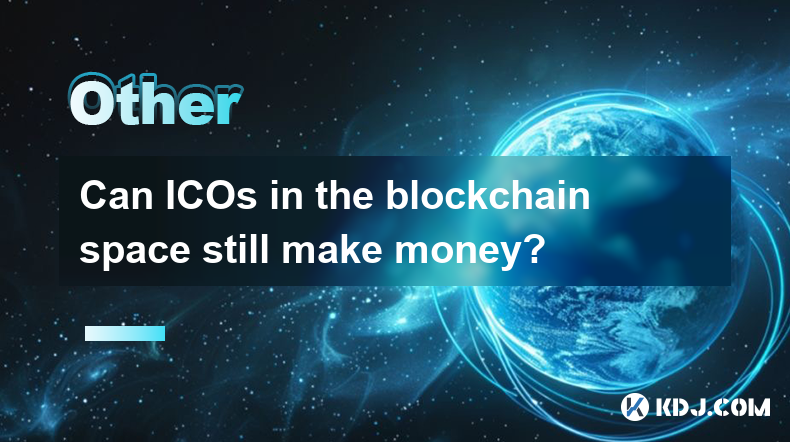
Can ICOs in the blockchain space still make money?
Apr 17,2025 at 08:29pm
The landscape of Initial Coin Offerings (ICOs) in the blockchain space has evolved significantly since their peak in 2017 and 2018. Despite the increased regulatory scrutiny and the rise of alternative fundraising methods like Security Token Offerings (STOs) and Initial Exchange Offerings (IEOs), ICOs can still be a viable way to raise funds and generat...
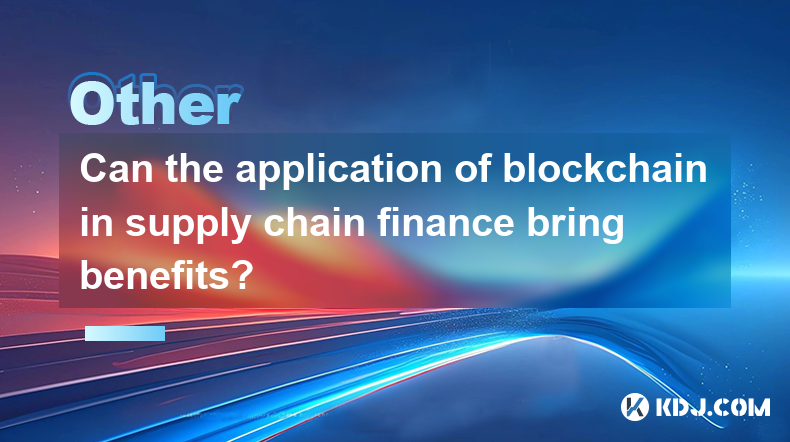
Can the application of blockchain in supply chain finance bring benefits?
Apr 15,2025 at 04:00pm
Can the application of blockchain in supply chain finance bring benefits? The integration of blockchain technology into supply chain finance has garnered significant attention in the cryptocurrency and financial sectors. This article explores how blockchain can potentially revolutionize supply chain finance, detailing its benefits and providing a compre...

Does the ranking of Chinese blockchain apps include cross-chain applications?
Apr 14,2025 at 04:00pm
The ranking of Chinese blockchain apps is a comprehensive evaluation that takes into account various aspects such as user base, transaction volume, and technological innovation. A pertinent question arises regarding whether these rankings include cross-chain applications. Cross-chain applications, which allow different blockchain networks to interact an...
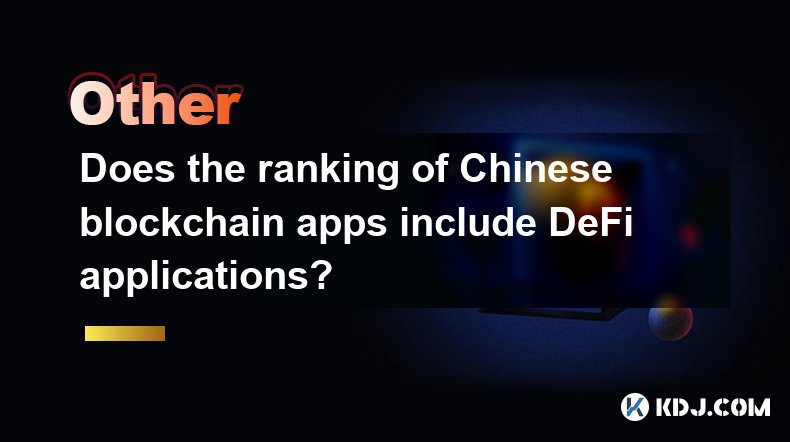
Does the ranking of Chinese blockchain apps include DeFi applications?
Apr 15,2025 at 06:57am
The ranking of Chinese blockchain apps is a comprehensive list that showcases the most popular and influential applications within the cryptocurrency ecosystem. One question that often arises is whether these rankings include DeFi applications. To answer this, we need to delve into the specifics of how these rankings are compiled and what types of appli...
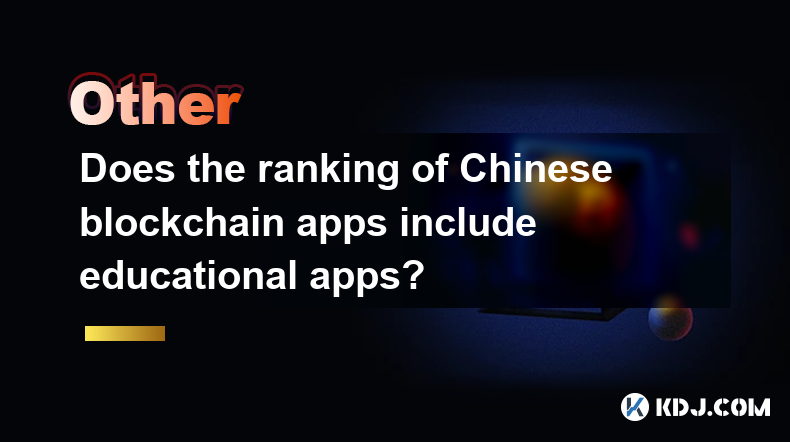
Does the ranking of Chinese blockchain apps include educational apps?
Apr 16,2025 at 03:35am
The ranking of Chinese blockchain apps often includes a variety of categories, from finance and gaming to social networking and beyond. One question that frequently arises is whether these rankings include educational apps. To address this, we need to delve into the specifics of how blockchain apps are categorized and ranked in China, and whether educat...
Does the ranking of Chinese blockchain apps include enterprise-level applications?
Apr 15,2025 at 06:42am
The ranking of Chinese blockchain apps often includes a variety of applications, ranging from consumer-focused to enterprise-level solutions. Understanding the scope and criteria for these rankings is essential to determine if enterprise-level applications are included. This article delves into the specifics of how Chinese blockchain app rankings are co...

Can ICOs in the blockchain space still make money?
Apr 17,2025 at 08:29pm
The landscape of Initial Coin Offerings (ICOs) in the blockchain space has evolved significantly since their peak in 2017 and 2018. Despite the increased regulatory scrutiny and the rise of alternative fundraising methods like Security Token Offerings (STOs) and Initial Exchange Offerings (IEOs), ICOs can still be a viable way to raise funds and generat...

Can the application of blockchain in supply chain finance bring benefits?
Apr 15,2025 at 04:00pm
Can the application of blockchain in supply chain finance bring benefits? The integration of blockchain technology into supply chain finance has garnered significant attention in the cryptocurrency and financial sectors. This article explores how blockchain can potentially revolutionize supply chain finance, detailing its benefits and providing a compre...

Does the ranking of Chinese blockchain apps include cross-chain applications?
Apr 14,2025 at 04:00pm
The ranking of Chinese blockchain apps is a comprehensive evaluation that takes into account various aspects such as user base, transaction volume, and technological innovation. A pertinent question arises regarding whether these rankings include cross-chain applications. Cross-chain applications, which allow different blockchain networks to interact an...

Does the ranking of Chinese blockchain apps include DeFi applications?
Apr 15,2025 at 06:57am
The ranking of Chinese blockchain apps is a comprehensive list that showcases the most popular and influential applications within the cryptocurrency ecosystem. One question that often arises is whether these rankings include DeFi applications. To answer this, we need to delve into the specifics of how these rankings are compiled and what types of appli...

Does the ranking of Chinese blockchain apps include educational apps?
Apr 16,2025 at 03:35am
The ranking of Chinese blockchain apps often includes a variety of categories, from finance and gaming to social networking and beyond. One question that frequently arises is whether these rankings include educational apps. To address this, we need to delve into the specifics of how blockchain apps are categorized and ranked in China, and whether educat...

Does the ranking of Chinese blockchain apps include enterprise-level applications?
Apr 15,2025 at 06:42am
The ranking of Chinese blockchain apps often includes a variety of applications, ranging from consumer-focused to enterprise-level solutions. Understanding the scope and criteria for these rankings is essential to determine if enterprise-level applications are included. This article delves into the specifics of how Chinese blockchain app rankings are co...
See all articles
























































































